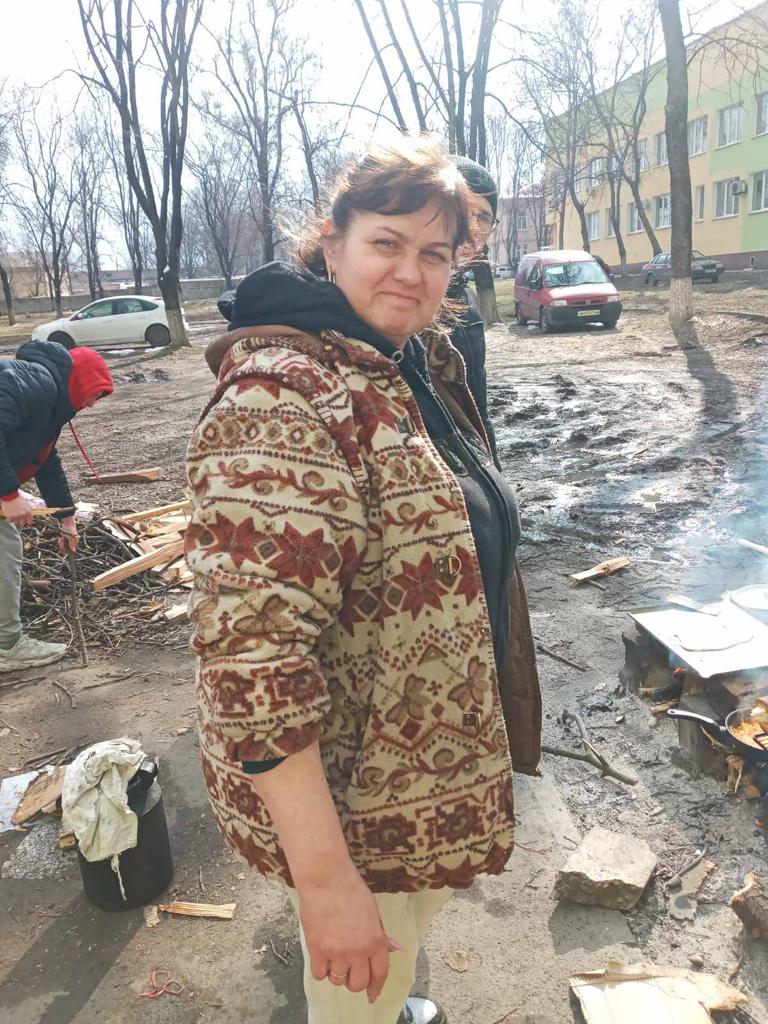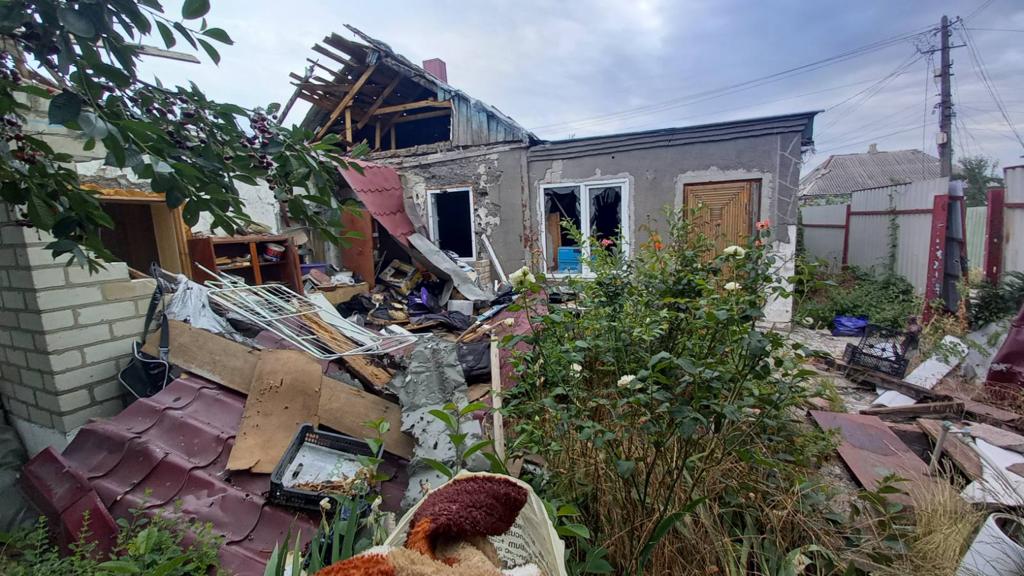Кадры из мариупольской больницы, на которых украинский солдат спрашивает мальчика: «Где твоя мама?», — облетели весь мир. Впоследствии они вошли в документальный фильм «20 дней в Мариуполе». На них — 10-летний Владик Гусак. Он и его родители, Олег и Ольга, пережили голод, авиабомбежки, угрозы расстрела.
Издание «Новая Польша» публикует историю мариупольских супругов о побеге из ада.
Евгений Приходько: Вы были в роддоме в Мариуполе, когда 9 марта 2022 года российский самолет сбросил на него бомбу. Как вы там оказались?
Ольга Гусак: Моя дочь Настя была беременна. После 24-го февраля она и другие родственники перебрались к нам. С каждым днем обстрелы учащались. Вокруг горели многоэтажки. Мы почти не выходили из подвала нашего частного дома. Уже в первые дни марта у нее начал тянуть живот. Я сама не могла помочь Насте рожать, я не врач. Поэтому мы побежали в обычную больницу, которая находилась рядом с нашим домом, но она уже не работала, врачей не было. В подвалах больницы прятались люди из близлежащих многоэтажек. Тогда я сказала зятю Владику, чтобы он брал Настю и ехал в больницу № 3, в роддом. Это центр города, там целый медицинский городок. Они поехали, но потом Владислав вернулся и сказал, что Насте нужна поддержка и что в больнице есть надежный подвал. Он настаивал, чтобы мы собирались и ехали туда, но мы не согласились.
Олег Гусак: Но он приехал второй раз. Сказал, что неподалеку от роддома организуют зеленый коридор, в районе спорткомплекса «Ильичевец», а значит, мы все вместе сможем безопасно выехать из Мариуполя. Это нас убедило и мы поехали в больницу. Мы бы и раньше выехали, но боялись, что прямо в дороге у Насти начнутся роды. А еще мы знали, что происходило в 2014 году, когда расстреливали машины, которые ехали без сопровождения. Выезжать было опасно.
ЕП: Ваши родственники поехали с вами?
Ольга: 24-го февраля мы обзвонили близких, которые жили в многоэтажках, предлагали им переехать к нам, потому что в нашем доме есть подвал, там безопаснее. 5 марта из восьми человек семеро поехали в больницу.
Олег: Брат Ольги не захотел ехать, решил остаться. Впоследствии дом разбомбили, он погиб.
ЕП: Как вы узнали о его гибели?
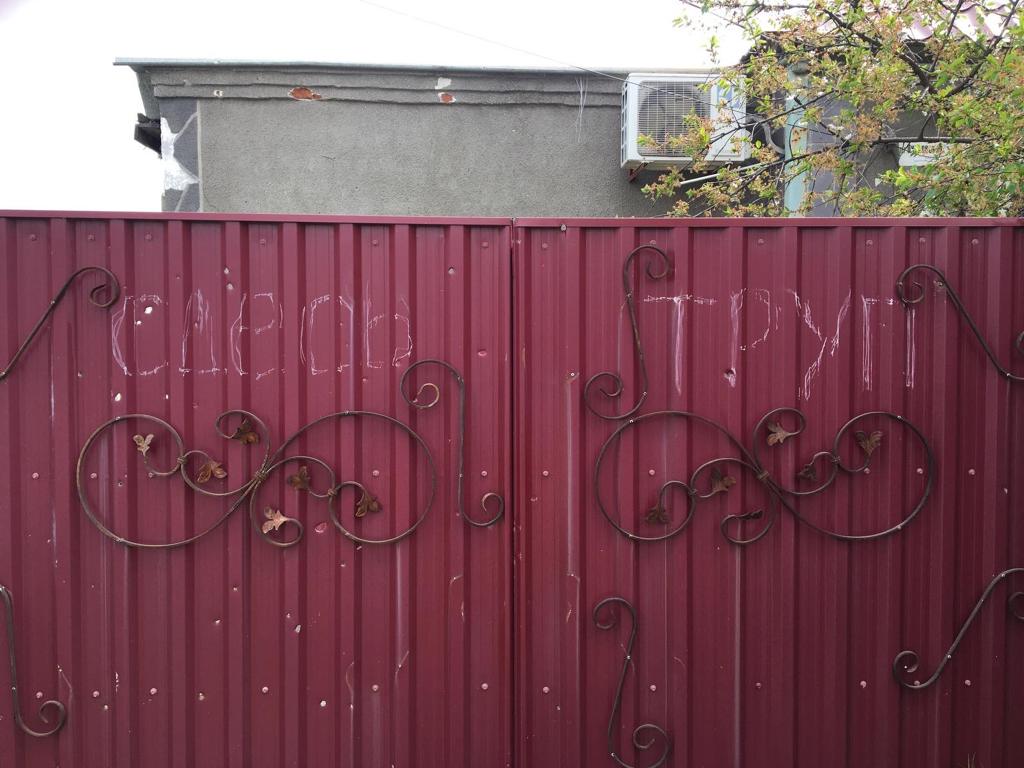
Олег: Был уже сильный запах. Поэтому и написали, что там труп.
ЕП: Вернемся в больницу.
Олег: В этой больнице, в подвале, мы были с 5 по 9 марта. В ночь на 8 число, где-то со 2-й по 4-ю ночи, ее обстреляли из «Градов». Снаряды попали в здание рядом, где принимали анализы. Я утром пошел туда — вокруг валялись железные шрапнели от снарядов. То есть россияне рассчитывали убить много людей.
ЕП: Как вы запомнили 9 марта?
Олег: Утром мы были на улице, то есть во дворе роддома, где моя жена готовила обед для всех жителей. За несколько минут до прилета авиабомбы в своем «Ланосе» я слушал украинское радио на средних волнах 87.3. Большинство людей было в подвале, часть беременных еще оставалась на втором этаже.
Ольга: Когда люди, которые отвечали за приготовление пищи, уехали, мы взяли это на себя. Мужчины носили дрова для огня. Из снега топили воду. Мы на улице как раз готовили еду, как неподалеку начался обстрел из «Градов». Мы спустились в подвал, а через некоторое время снова вышли наружу, потому что надо было дальше готовить еду. Через 15-20 минут начался авианалет.
ЕП: Что вы услышали?
Олег: Этот звук невозможно ни с чем спутать. Бомбардировщики — сверхзвуковые. Пронзительно и очень сильно гудят. У нас было четыре секунды. Один, два, три, четыре… б-у-у-у-у-х.
ЕП: Вы начали бежать в подвал?
Олег: От костра, где готовили еду, до входа в подвал было примерно пять метров. Я начал бежать за Ольгой — она уже спускалась по лестнице — как раздался взрыв. Ударной волной ее отбросило о металлическую дверь. Я упал ей на ноги. Левую часть моего пуховика разорвало в клочья. Из левого уха и подбородка текла кровь. Теперь в голове и левом ухе постоянно шумит и звенит, я плохо слышу. Получил травму плечевого сустава, из-за чего левая рука до локтя не работает. Нас засыпало стеклом, привалило металлом, бетоном. Ольге посекло лицо. Наш десятилетний сын Владислав тогда был с Настей в подвале.
На первых секундах видео Ольга и Олег Гусаки после российского авиаудара по роддому в Мариуполе.
Ольга: Я помню только взрыв.

Олег: Говорят, было два взрыва, но я слышал только один. Какое-то время мы лежали среди всего этого без сознания. Потом я подполз к жене. Меня охватил ужас. Подумал, она мертва. Я кричал ее имя. Стояла сплошная стена пыли. Через несколько секунд, может быть, минут, она открыла глаза. Ее лицо и голова были в крови. Мне и брату зятя удалось затащить ее в подвал. Посадили на стул. Я достал из аптечки, висевшей на стене, кусок ваты и сильно прижал разорванную рану на щеке жены. Кажется, прошло совсем немного времени, как мы услышали: «Раненые есть?». Это были мариупольские полицейские.
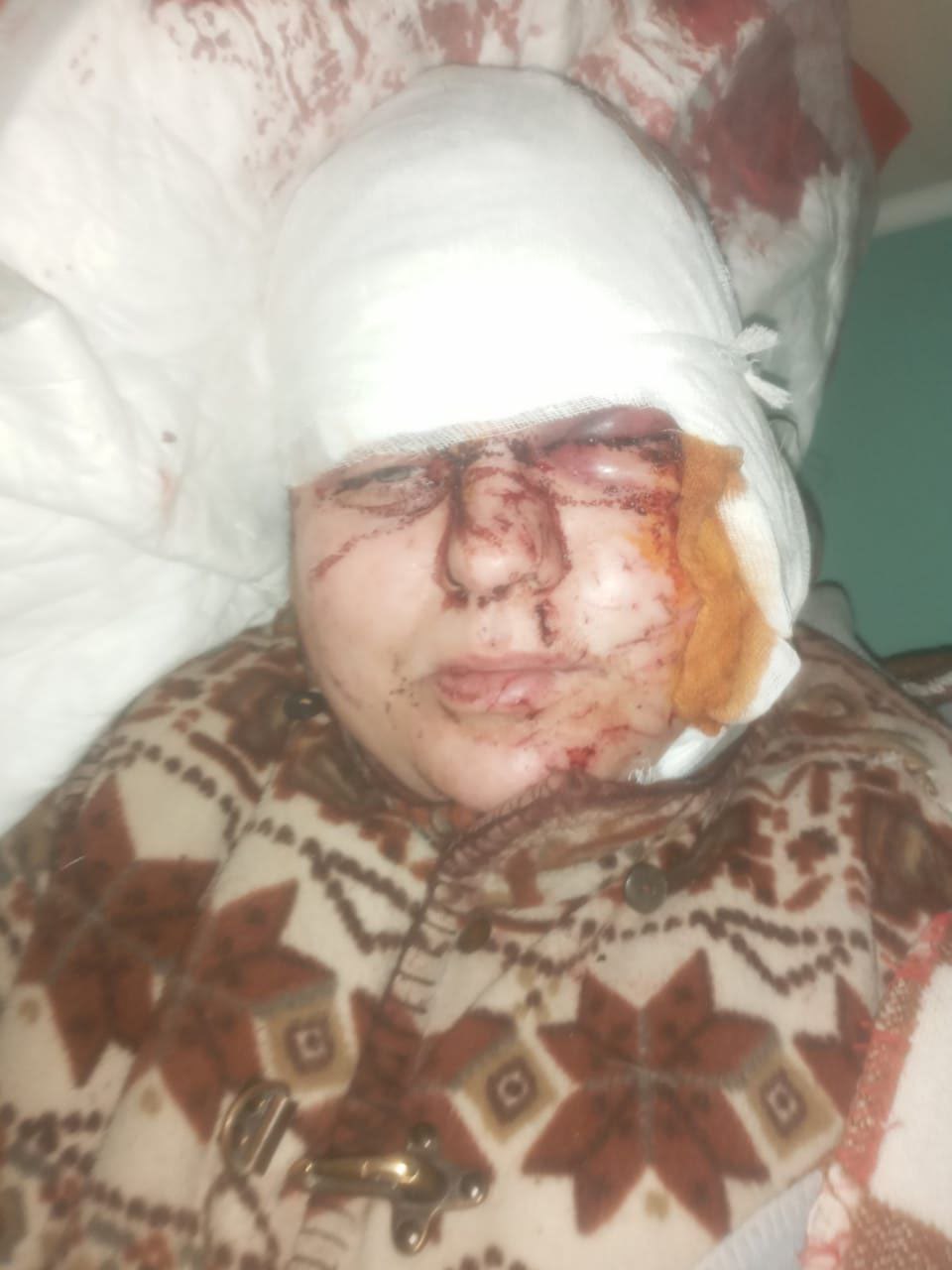
Ольга: Меня под руки вывели, посадили в полицейскую машину и отвезли в больницу №2. Дети (как уже позже мы узнали) остались на территории больницы №3, в здании хирургического отделения. Так мы потерялись и долго ничего не знали друг о друге. Правда, Владик после взрыва нашел мою сумку со всеми нашими документами.
В больнице №2 мне зашивали лицо без наркоза. Я то приходила в себя, то вырубалась. Мне сделали только одну перевязку. Зеленкой помазали, и все, потому что в больнице уже не было никаких медикаментов. Потом меня на носилках подняли на третий этаж. Поскольку я потеряла много крови, мне не давали спать, потому что я уже могла потом и не проснуться. Я ничего не понимала, не знала, где дети, что с ними. Через два дня я уже начала потихоньку ходить.
ЕП: Это уже было 11 марта?
Ольга: Да. Когда нас привезли во «вторую» больницу, эту территорию еще контролировала Украина. Вечером наши военные забрали своих раненых и вышли из больницы. На следующий день, 12 марта, зашли россияне. В двух концах больницы они поставили по танку. 13-го один из них развернул дуло и выстрелил в больницу.
ЕП: Так они же уже ее захватили.
Ольга: Да, оккупанты уже даже успели своих раненых завезти. Они попали между четвертым и пятым этажом. Мы лежали на третьем, сразу бросились с кроватей и начали бежать в подвал. С тех пор мы там и сидели.
ЕП: Россияне постоянно находились в больнице. Они разговаривали с вами?
Ольга: Мы жили с этими уродами до 25-го марта. Они говорили, что пришли нас освобождать от фашистов. В основном это были «дэнээровцы» и чеченцы. «Денееровцы», как бомжи — форма потрепанная, грязная. У них были не только «AK», но и винтовки Мосина 1943-го года. Такие вот «освободители» пришли нас освобождать. Они, идиоты, даже не могут сравнить, что у нас хорошо, а у них плохо.
Олег: Пришли нас освобождать — от работы, домов, жизни.
ЕП: Как часто они заходили к вам в подвал?
Ольга: Они заходили и забирали людей. Там был оккупант, сам из Донецка, но все называли его Осетином. Как-то он провел мимо нас двух девушек. У него в руке был пистолет. Они шли по подвальному коридору: девушки впереди, он за ними. Когда завернули за угол, сразу раздалось два выстрела. Конечно, никто не побежал смотреть, что там с ними, — потому что и тебя убьют.
ЕП: Вас тоже хотели расстрелять.
Ольга: У них откуда-то была информация, что женщина с поврежденным лицом ставит растяжки. Они считали меня диверсанткой и хотели убить.
ЕП: Как это происходило?
Ольга: Видимо, тот же Осетин направил к нам в подвал солдата, который искал эту якобы диверсантку. Я сидела после ранения, замотанная в плед. Он подошел ко мне, перезарядил автомат и сказал: «Открывай лицо!». Я открыла, а оно у меня в шрамах после взрыва. «Пошли». Олег встает и говорит: «Я — ее муж. Куда вы ее забираете?» — «Это диверсантка». Нас отвели к трем нашим пленным ребятам из теробороны. Они должны были опознать женщину, которая якобы ставит растяжки. Оккупанты поставили меня перед ними. Тогда ребята сказали: «Нет, это не она». Если бы они ответили: «Да», — меня бы на месте расстреляли. Было очень страшно.
ЕП: И все это время вы не знали, живы ли ваши дети.

Украинский солдат и Владислав Гусак после российского авиаудара по роддому в Мариуполе. Источник: warmonolog.com.ua
Ольга: Как-то в подвал больницы пришел священник московского патриархата и сказал, что был второй прилет на роддом и все, кто там остался, погибли. У меня сразу началась истерика, потому что мы считали, что наши дети до сих пор там. Меня схватила Марина (мы семьями сдружились в подвале) и спросила, что я чувствую. Я сказала, что мои дети не могли умереть, они живы! И она ответила: «Значит, они живы. Пока ты не увидишь их тела, они живы!» Мы не знали, что после больницы № 3 их вывезли недалеко от «Азовстали», в другой роддом, на левом берегу Мариуполя.
Олег: Вы не представляете, что это было, как ее трясло. Мы, мужчины, по-другому реагируем, а женщины — они же матери, у них очень сильные эмоции.
Ольга: Я понимала, что если, не дай бог, моих детей больше нет, я не смогу жить. А умереть там очень легко, ведь нас нон-стоп обстреливали.
Олег: Потом мы на заднем дворе уже больницы № 2 начали готовить еду, разожгли костер. Мы видели, как неподалеку проезжали танки, БТРы, легковые авто с «Z».
Ольга: Олег пытался пройти хотя бы сто метров, но это было невозможно. Повсюду снайперы, прилеты. Когда мы видели, как кого-то привозят в больницу, то спрашивали у них, где и как их задело. Кто-то шел за водой, кто-то стоял в очереди за хлебом. Россияне накрывали скопления людей. Я очень боялась самолетов. Один из оккупантов видел, как я вздрагиваю от них, и сказал: «Да чего ты боишься, ты не бойся, у него есть координаты. Он просто квадратами выбегает».
Олег: Если квадрат контролируют украинцы, оккупанты будут его стирать под ноль. Они этого не скрывали.
Ольга: На нашем микрорайоне «Черемушки» из нескольких десятков многоэтажек осталось только две.
Олег: Поэтому когда в ООН рассказывают, якобы в Мариуполе погибло 20-30 тысяч человек, — не верьте. Там погибло, я считаю, более 100 тысяч. Например, наша семья: четыре человека жили в доме, из них одного убило. И так во многих семьях. Есть знакомые, которые убиты семейством. Есть знакомые, у которых убили детей, которые играли и росли с нашим сыном. Думаю, погиб каждый четвертый мариуполец.
Ольга: На место, где мы готовили еду, россияне приволокли мертвого украинского солдата. Они положили тело у самого входа — мы должны были ходить мимо него и смотреть. Так они давили на нас морально. Даже когда мы выезжали, тело еще лежало при входе.
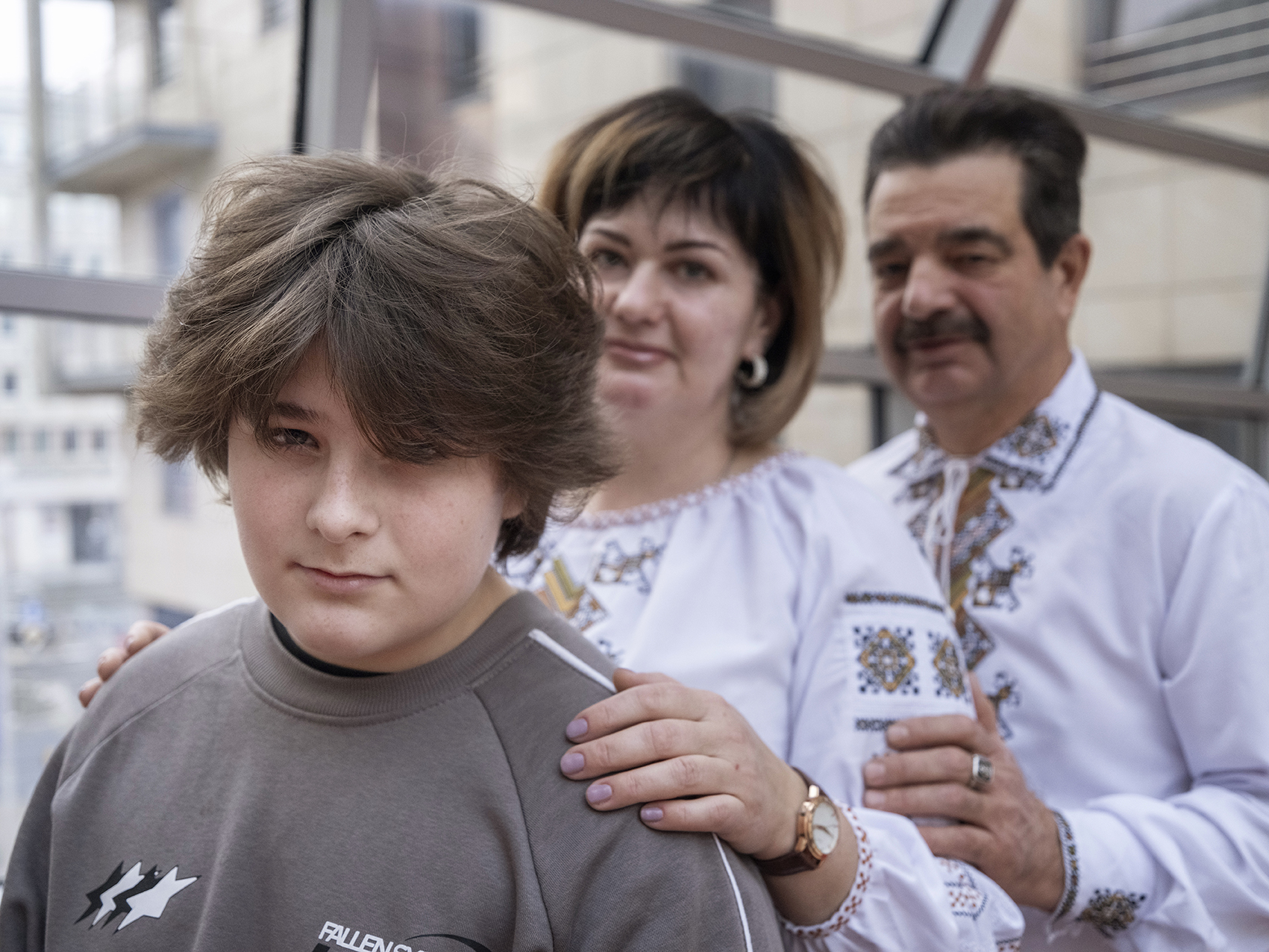
ЕП: Как вы оттуда выбрались?
Ольга: Внезапно появилась связь. Не знаем, почему и как это произошло. У Олега впервые за месяц зазвонил телефон. Настоящее чудо. Мы сидели на улице, была хорошая погода, и вдруг звучит рингтон. Мы за это время даже забыли, как это. С нами связался одноклассник Олега — он увидел видео из роддома, узнал на нем Владика и разыскивал нас. Сказал, что эти кадры увидел весь мир.
ЕП: Как вы заряжали телефоны, пока были в больнице?
Ольга: Нам помогала санитарка. Она брала наши телефоны и где-то заряжала. Мы их использовали как фонарики.
ЕП: Куда вы поехали?
Ольга: Мы не хотели выезжать из этого ада, пока не найдем детей. За Мариуполем были пансионаты, туда не прилетало, поэтому мы с родственниками поехали в том направлении. По дороге на первом блокпосту Олега чуть не расстреляли.
Олег: У меня не было документов, только водительское удостоверение. Оккупант начал требовать документы. Я первый раз не услышал — я же после взрыва не очень слышу на одно ухо. Он во второй раз спросил о документах. Пока я пытался их достать, он уже нацелил на меня автомат. Далее сказал мне выйти из машины. Отобрал телефон и начал в нем рыться. В телеграмме он увидел, как я кому-то написал, что придут рашисты и тогда вы узнаете, что это такое. «А, так ты из этих самых, — начал оккупант, — Твой дед воевал против фашистов, а ты сейчас за них. Ты что, не знаешь, что они сделали с Украиной?». Он сказал, что сейчас меня расстреляет и все спишут на войну. Я достал крестик, зажал в зубах, думаю: ну, пошли. Но тут какой-то старший россиянин, который недалеко занимался задержанными ромами, сказал этому: «Да брось ты его, отпусти». Я подумал: «Нихрена себе». Мне чудом повезло.
Ольга: Дальше у нас уже более-менее была связь. Мы начали узнавать о детях. Выяснили, что они на левом берегу, что Настя 22-го марта родила мальчика и с ним все хорошо. Но они о нас ничего не знали. Теперь была новая проблема: как перевезти оттуда детей. Через город никак — между левым и правым берегом мосты разрушены и постоянный обстрел «Азовстали». Единственный путь — в объезд через «ДНР» до Новоазовска, а оттуда в Мариуполь, а это означало фильтрацию и большую вероятность, что дальше нас уже никуда не выпустят.
Я каждый день звонила детям, писала СМС. Никакого ответа. Но была надежда: вдруг у них появится связь, вдруг как-то прочитают. У меня часто спрашивают, как я не сошла с ума. Я, честно говоря, не люблю читать, а там за семь дней прочитала пять книг.
ЕП: Какие?
Ольга: Детективы. Они валялись в том домике для отдыха. Так я отвлекалась.
Олег: Жена садилась у окна с 5 утра и читала.
Ольга: На улице я как-то заметила группу детей. Один из мальчиков был очень похож на Владислава. Такая же шапка, такая же куртка, такая же походка. Я на него постоянно смотрела. Дети, наверное, думали, что я какая-то сумасшедшая тетя. Потом я узнала, что этого парня тоже зовут Владислав. Как-то я купила ему сладости. Подумала, что это же и моего ребенка кто-то сейчас угощает.
Еще я ходила в пункты поиска родственников. Мы знали где дети, но они ничего не знали о нас. Настя мне потом говорила: «Мам, я была уверена, что 18 марта, где бы ты ни была, ты нас найдешь, даже если придется ползти, потому что 18-го у Владислава день рождения». Она была убеждена, что если я жива, то разыщу их 18 марта. День рождения Владика они праздновали в подвале, ему тогда подарили пряник — больше ничего не было.
«И когда этот день наступил, а ты нас так и не нашла, я с тобой попрощалась», — рассказывала мне Настя уже потом. Тогда она тоже вспомнила, чему я ее всегда учила: «Запомни, родители родителями, но если будет стоять вопрос родителей и собственных детей, то всегда выбираешь детей». Именно поэтому она решила уезжать. А на следующий день россияне бросили на «Азовсталь» химическую бомбу.
ЕП: Когда вы впервые связались?
Ольга: 11 апреля где-то в 12:00 ночи я по традиции по очереди набираю всех их. И тут Владислав поднимает трубку. Я не верю своему счастью. «Сынок, сынок». Он кричит: «Мамочка, мамочка. Настя-я-я, мама звонит». Тогда Настя рассказала, что они на границе.
Олег: Я начинаю кричать, потому что понимаю, что это российская граница. А они на том самом видео из роддома, они свидетели военных преступлений россиян.
Ольга: Олег боялся, что их убьют, начал кричать, чтобы вернули хотя бы Владислава. Владик кричит, что не хочет умирать, что боится туда ехать. Тогда я уже кричу в трубку Насте: «Делай, как считаешь нужным. Выезжайте, я вас найду!».
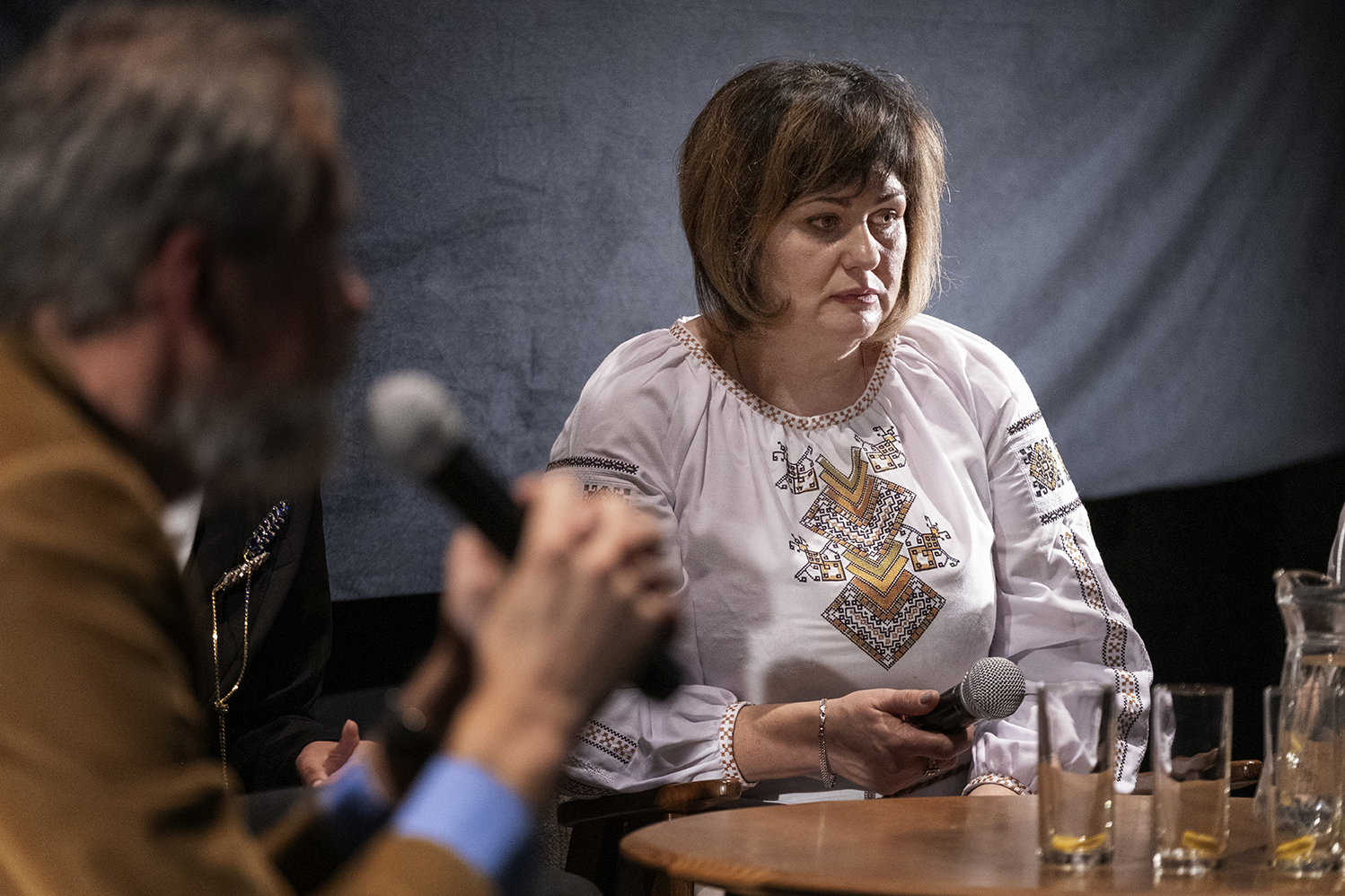
ЕП: Кто их вывез?
Ольга: Какие-то французы, которые приехали делать репортаж в больницу. Они обещали Насте, что помогут пройти без очереди и фильтрации. И все так действительно было.
Олег: Если бы россияне взяли телефон Владыки, это был бы конец.
ЕП: А что было в том телефоне?
Олег: Перед войной я отдал свой телефон сыну. Там были номера участников АТО и не только. Телефон «не почищен». Поскольку я был председателем независимого профсоюза Мариупольского торгового порта, то также связывался и переписывался с работниками различных следственных органов и структур. Я со своими товарищами боролся в порту с коррупцией.
Ольга: Им очень повезло, что россияне не проверили телефон.
ЕП: Как вы планировали выезд?
Ольга: Дочери от первого брака Олега вместе с Настей начали искать, кто бы нам помог. Они нашли водителя, который готов был за пять тысяч долларов вывезти нас оттуда на подконтрольную России территорию. Но водитель не приехал, поэтому мы решили идти пешком. По берегу над морем не пошли, потому что нам сказали, что там все заминировано. Хотя наш друг на велосипеде доехал до Крыма.
ЕП: Из Мариуполя? В Крым? На велосипеде?
Ольга: У него прозвище Суицидник.
Олег: Он очень добрый, человек, но без тормозов. Он ехал в Крым на велосипеде и по дороге увидел танк, возле которого возились военные — танк не заводился. Он сначала не мог разобрать, чьи они, а уже потом выяснилось, что это русские. Суицидник подъехал ближе, спросил, нужна ли помощь. А у него же золотые руки. Он копался, копался, копался и танк завелся. Русские ему приказали ехать с ними в штаб — мол, нам такие, как ты, нужны. Ну, он айда на велосипед и по полям — бежать от них. Более того: потом он из Крыма вернулся обратно в Мариуполь, увидел свой разбитый дом и поехал обратно в Крым.
ЕП: Сейчас известно, что с ним?
Ольга: Он — крымский татарин. Наш, украинец. Скорее всего, в Крыму, там его родные.
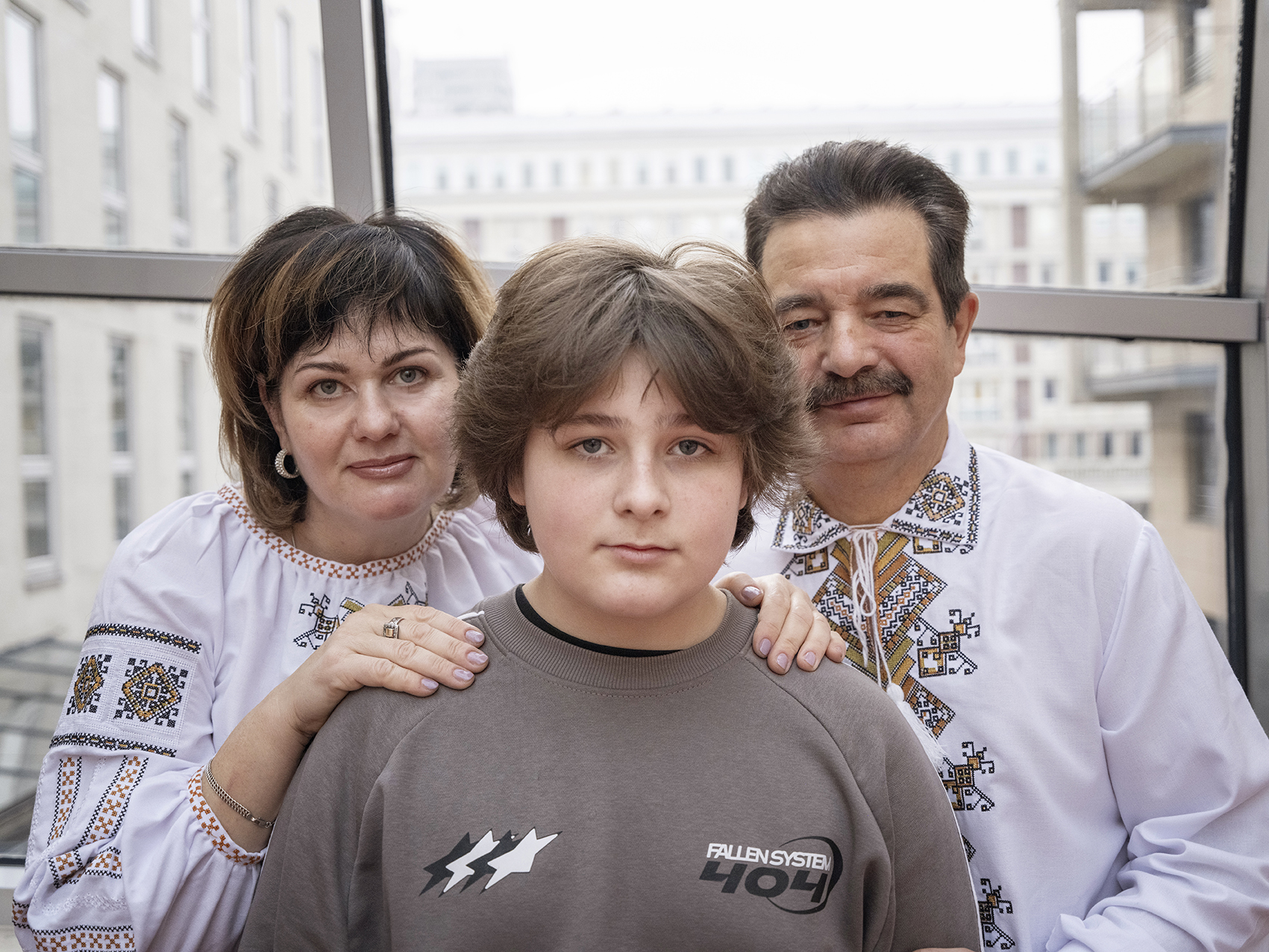
Олег: Поэтому мы решили идти пешком, но узнали, что неподалеку волонтеры вывозят автобусами людей на Бердянск. Больше мы ничего не знали. Мы решили их разыскать — я, жена и Евгений, друг и коллега по работе, который тоже выехал из Мариуполя и жил с нами в пансионате.
Было 14 апреля. Лил дождь, под ногами страшное болото — мариупольская грязь ужасная. Прошли мы где-то пять километров, увидели микроавтобус, вокруг много людей. Сказали, что вывозят в Запорожье. Мы готовы были им целовать ноги. Водитель спросил, поедем ли мы стоя? Так хоть на одной ноге.
ЕП: Как вы проходили блокпосты?
Ольга: Дорогу, которая обычно длится 2-3 часа, мы ехали 12 часов. Я все время молилась. В общем мы прошли 25 блокпостов. На каждом мужчин раздевали. Смотрели, есть ли синяки от прикладов, какие татуировки. Мы проезжали мимо танков. На трех постах чеченцы Олега не раздевали, говорили: батя, заходи обратно в автобус. Думали, что ему лет 80. Так он тогда выглядел.
На одном из блокпостов «деэнеровец» увидел в моем телефоне сообщение, что пришла зарплата. «Что это за деньги?» Я на него смотрю и думаю: «Ты что, идиот?». Это же они наверняка не знают, что зарплата может приходить на банковскую карту. Дикари. У кого-то в телефоне они увидели группу ОСМД и подумали, что это как-то связано с СБУ. Им люди очень долго объясняли, что это просто объединение совладельцев дома. На одном блокпосту бывший украинец, сейчас «деэнеровец», урод, подходил к мужчинам и задавал вопросы на русском. А потом резко переходил на украинский с вопросом: а где работал?
Олег: За ответ на украинском как минимум могли отбить почки. В худшем случае — расстрелять.
Ольга: Возле последнего российского блокпоста мы проезжали по заминированному отрезку дороги. Потом я увидела столб с маленькими голубовато-желтыми флажками. Украинский блокпост. Счастье! В автобус зашел наш военный, западенец, и такой: «Все живы, все здоровы? Добро пожаловать!» Я не могла поверить, что мы выбрались из того ада. Когда мы приехали в Запорожье, выглядели как бомжи. Первое, что сделали, — купили шаурму. Так хотелось есть. На следующий день мы поехали в Черкассы, там живет мама Олега.
Олег: Но в автобусе, которым мы выезжали из Мариуполя, также были те, кто просто ехал по каким-то делам в Запорожье, а потом возвращался обратно. Им все нормально было.
Ольга: Да, там есть те, кто ждал россиян.
ЕП: Даже после того, что увидели и пережили?
Олег: Я не верю, что до таких может что-то дойти.
Ольга: До некоторых уже доходит. Они же прямо не скажут, что они — придурки и не понимали, что такое Россия. «Оля, это уже не тот город, это уже не та жизнь». Я же чувствую, о чем они. Думаю, раз вы ждали — теперь живите там. Мне их не жалко.
Олег: На моей работе, в бригаде из 59 человек, в 2013 году, человек 20, если не больше, явно были против Украины. То есть против того, что украинцы брали курс на Запад. 5-6 были за украинское будущее в сообществе с европейскими государствами. Остальные «тихушники» — «ждуны». Но чья это вина? У нас в микрорайоне, когда дочь в 90-х пошла в школу, был только один украинский класс. 30 лет вопросом языка и превращением советского менталитета в сознательный украинский, особенно в нашем регионе, почти никто не занимался. Да, были трезвомыслящие люди, но очень малый процент. В Украине не заботились о родном языке и не искореняли российское телевидение и сайты, которые завладели мозгами значительной части населения.
Не развивались новые демократические независимые профсоюзы, которые тоже многое бы объясняли рабочим. Их просто уничтожали. Руководители разных уровней, председатели «карманных» профсоюзов с советскими корнями, имея собственные ведомственные СМИ и сайты, не проводили соответствующие встречи, не рассказывали и не разъясняли своим подчиненным (а это десятки тысяч мариупольцев), ни о целях Майдана, ни о захватнической войне, которую Россия развязала против Украины еще в 2014 году. Яркий тому пример — Мариупольский порт. Вот к чему это привело.
ЕП: Какие сейчас у вас настроения?
Ольга: Я сама — русскоязычная, но считаю, что в Украине русский язык вообще не должен звучать. Нам нужна железобетонная ограда с Россией, чтобы РФ из-за нее даже не было видно. С 1991-го Украина не участвовала ни в каких войнах, а русня сунула свой нос всюду — Приднестровье, дважды Чечня, Грузия, Сирия, Украина.
Олег: Они что-то нам за Донбасс рассказывают, а сами по Чечне два раза проехались, убивая людей со своими же, российскими паспортами. Они ничего не знают о собственной истории, как все на самом деле происходило во Вторую мировую и кто помог Советскому Союзу победить. Они этого не понимают.
Ольга: Одна наша знакомая, москвичка, спросила, почему Настя не сделала в марте в Мариуполе свидетельство о рождении ребенка. Города нет, какое свидетельство? А она начала расспрашивать, почему тогда в «ДНР» не сделали. Я ей ответила: «»ДНР» — не Украина. «ДНР» — это ваши русские ублюдки». А она мне: «Я уже ничего не понимаю».
ЕП: Сейчас поддерживаете с ней связь?
Ольга: Нет. У меня есть другая знакомая россиянка, которая жила в Мариуполе. После 24-го февраля она не общается со своими родственниками из России. Говорит им: «Вы зомбированные придурки». Как-то сказала мне: «Ты даже не представляешь, как я ненавижу русню». А я ей честно ответила, что думала, что она из оккупации выехала в Ростов, а не Одессу. «Ты шо? Да когда выезжала из Марика, эти уроды на блокпосту спрашивали, есть ли у меня чай. Я им так бросила на землю — вот. Если бы у них не было автоматов, я бы им глаза выцарапала».
ЕП: Как Настя с мужем, ребенком и Владиславом выезжали из России?
Ольга: Их не выпускали из России, потому что у малыша не было свидетельства о рождении. Россияне заставляли Настю сделать российское свидетельство, и ее это взбесило. Она на российской границе кричала: «Запомните: мой сын родился в Украине, он — украинец!» К ее мужу подошел российский таможенник и сказал: «Угомони свою жену». Тот ему ответил: «Тебе надо, ты — и угоманивай, а я рисковать не буду».
До войны у Насти было заурядное отношение к России. Она говорила, что там тоже люди, дети, и что у нас тоже есть свои минусы. 24 февраля все изменило. Все в России — зомби, уроды. Она их ненавидит. Ее мировоззрение перевернулось. Осознание того, что она — украинка, пришло моментально, с началом полномасштабной войны. Честно говоря, я даже боялась, что Настя с мужем решат остаться в России. Когда я ей это сказала, она ответила: «Мам, как ты могла обо мне так подумать?»
ЕП: Сейчас они в Нидерландах. Как им все-таки удалось уехать?
Ольга: Когда она звонила, я почувствовала, что она на грани. На ней — двухнедельный ребенок, брат. Поэтому мы взяли ноги в руки и поехали в черкасский ЗАГС. Когда я туда залетела, у меня все было написано на лице. Олег объяснил, что россияне не выпускают дочь из России из-за отсутствия свидетельства о рождении. И нам в Черкассах сделали этот документ. Мы отсканировали и выслали Насте свидетельство о рождении ее сына и нашего внука, украинца Дамира.
Олег: Они нашли цветной принтер уже в Беларуси и напечатали там свидетельство. После того, как россияне не пропустили их в Латвию, они поехали в Беларусь. Между границей России и Беларуси был небольшой обычный пост. Их пропустили в Беларусь даже не просмотрев все документы.
ЕП: И белорусы пропустили их в ЕС?
Ольга: Да их без проблем выпустили в Латвию. Машину особо не проверяли. Единственное, что спросили у Владика, не вывозят ли его силой, ведь фамилия у него была другая.
ЕП: Когда вы впервые увиделись с Настей?
Ольга: Из Черкасс, после лечения в местной больнице, я отправилась во Львов. Затем с польско-украинской границы в Нидерланды меня везли немецкие волонтеры, которые распределяли украинцев по странам ЕС. 7 мая они привезли меня к моим детям в Роттердам. Настя с мужем и Владиком как раз были на улице. А мы уже подъезжали. Вдруг я как закричу: «Сто-о-оп!». Немцы резко по тормозам. Машина остановилась посреди дороги. Я выпрыгнула из нее и давай бежать к детям. Такой была наша первая встреча через почти два месяца после развода в Мариуполе.
ЕП: Вы бы хотели вернуться жить в Мариуполь?
Ольга: Нет. Я очень хочу туда поехать — там похоронены мои родители, брат. Но жить там я не смогу. У меня сорвет крышу. А во-вторых, я не смогу общаться с этими уродами, которые ждали «русский мир». Меня либо убьют, либо посадят. Мы бы хотели заработать денег, купить где-то квартиру в маленьком городке в Украине и спокойно жить, но после 24 февраля мы уже не строим планов. Мы каждое утро просыпаемся и на этом благодарим бога. В тепле, не голодные — большего нам уже не надо.
Дом Гусаков после российской бомбардировки. Источник: Личный архив семьи Гусаков
ЕП: Наверное, очень сложно каждый раз рассказывать то, что вы пережили.
Ольга: Да, но мы готовы об этом кричать. Чтобы этот ужас не пришел в другие страны. Россию надо остановить. Мы хотим, чтобы весь мир знал: россияне — преступники. Мы хотим, чтобы им даже не давали права говорить.
Олег: Оставить их там за забором, пусть живут в своем мире и сжирают друг друга.
Ольга: Очень хочется, чтобы Путина, Лаврова, всю их банду судили в Гааге. А потом чтобы их отдали украинцам. Мы бы их по частям рвали. В Мариуполе нет семьи, которая бы не пережила какой-то ужас или не потеряла кого-то из родных. Россияне должны за это ответить.

